The Impact of Artificial Intelligence on Living Standards in India
VerifiedAdded on 2023/04/03
|12
|1920
|104
Project
AI Summary
This project investigates the impact of Artificial Intelligence (AI) on India's development, focusing on how AI can bridge gaps in living conditions across different sectors. The research begins with an introduction to AI and its potential in India, followed by an examination of the current technological landscape. A comprehensive literature review explores the opportunities AI presents in healthcare, education, transportation, and other key areas. The methodology outlines a quantitative research approach using online surveys to collect data from 100 individuals. The budget and anticipated results are presented, highlighting the expected outcomes and the research's contribution to understanding AI's role in improving living standards. The project concludes with a timeline and a list of references, providing a structured overview of the research process and its findings. The project aims to identify the impact of AI on building bridges in gas of living conditions of people in India, and the research has used quantitative research approach for collecting data and information related to the research topic.
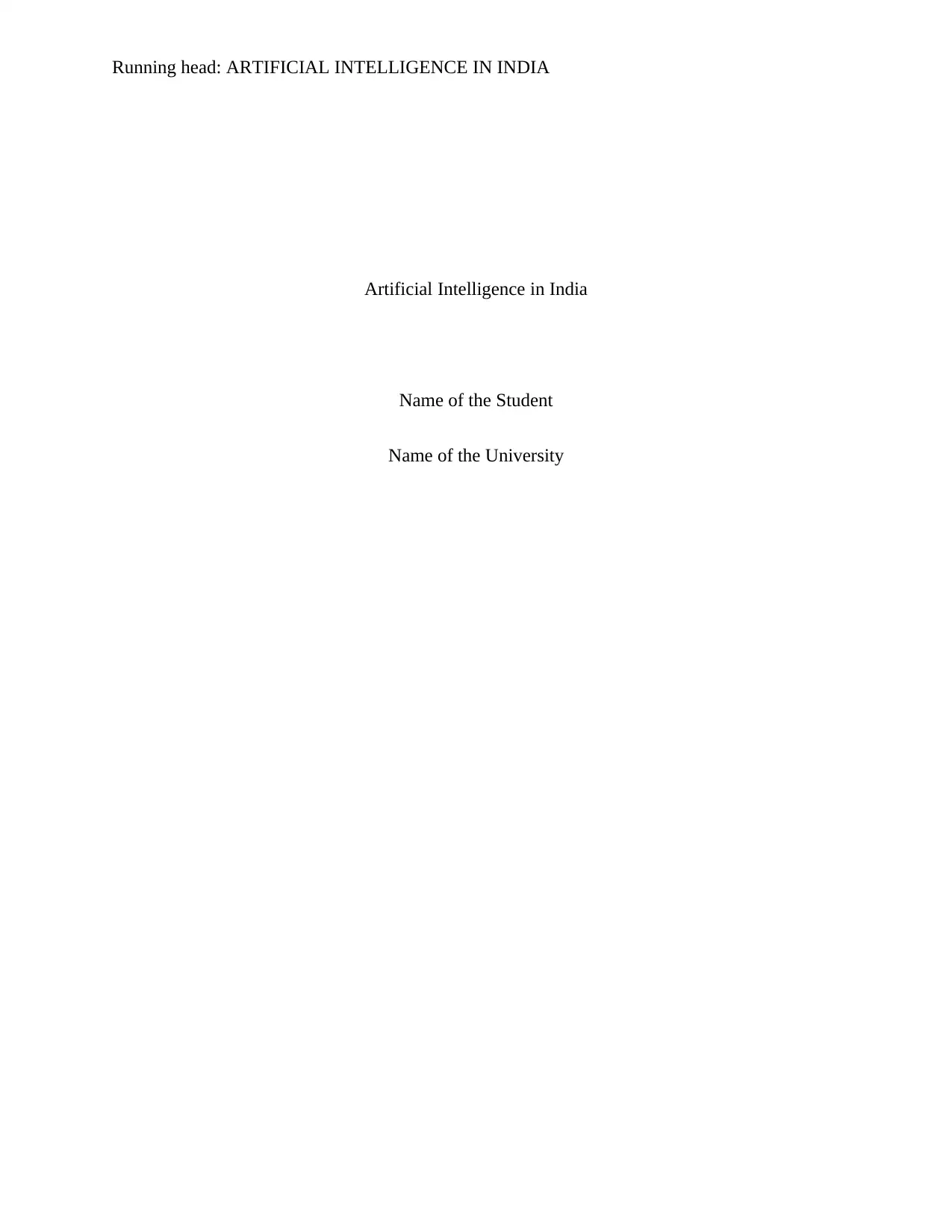
Running head: ARTIFICIAL INTELLIGENCE IN INDIA
Artificial Intelligence in India
Name of the Student
Name of the University
Artificial Intelligence in India
Name of the Student
Name of the University
Paraphrase This Document
Need a fresh take? Get an instant paraphrase of this document with our AI Paraphraser
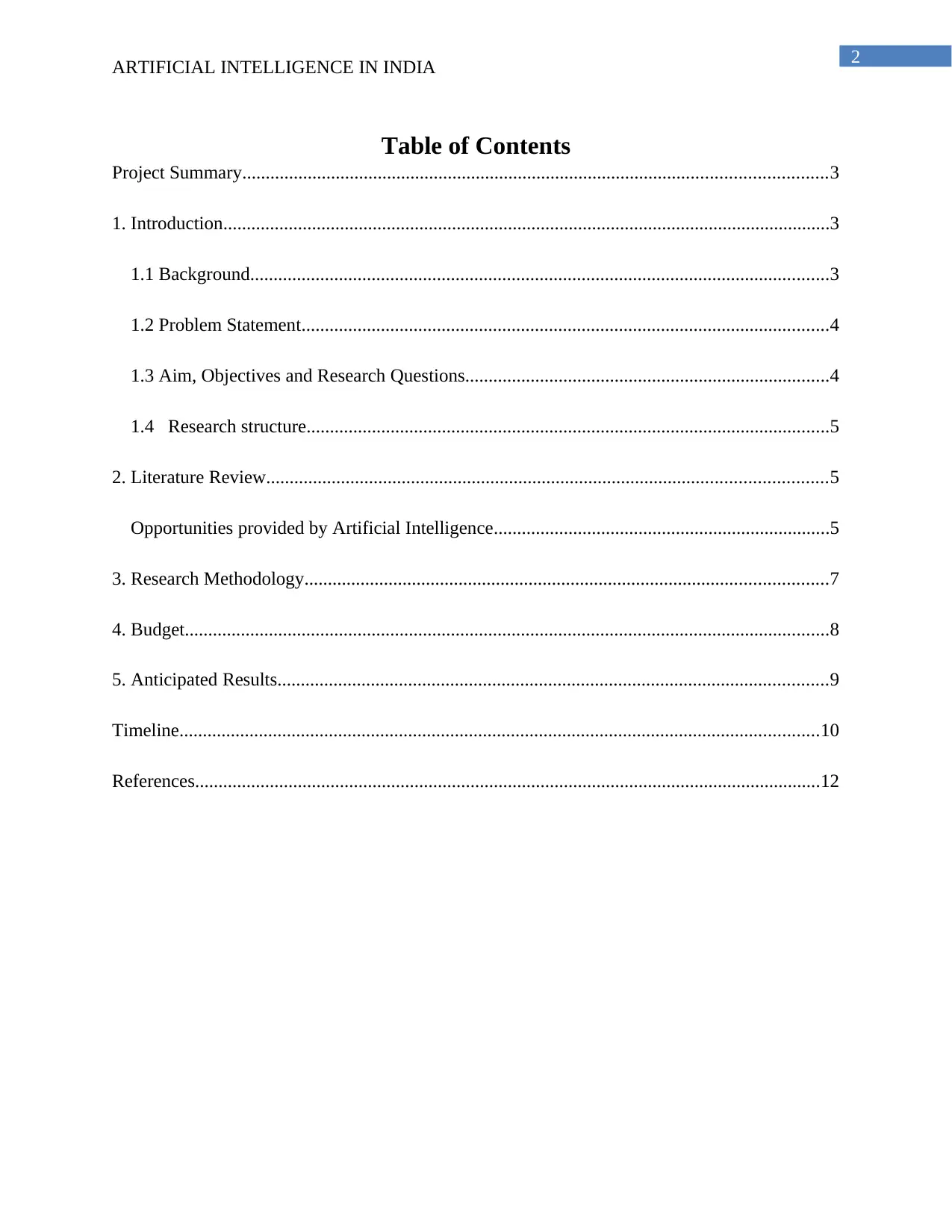
2
ARTIFICIAL INTELLIGENCE IN INDIA
Table of Contents
Project Summary.............................................................................................................................3
1. Introduction..................................................................................................................................3
1.1 Background............................................................................................................................3
1.2 Problem Statement.................................................................................................................4
1.3 Aim, Objectives and Research Questions..............................................................................4
1.4 Research structure................................................................................................................5
2. Literature Review........................................................................................................................5
Opportunities provided by Artificial Intelligence........................................................................5
3. Research Methodology................................................................................................................7
4. Budget..........................................................................................................................................8
5. Anticipated Results......................................................................................................................9
Timeline.........................................................................................................................................10
References......................................................................................................................................12
ARTIFICIAL INTELLIGENCE IN INDIA
Table of Contents
Project Summary.............................................................................................................................3
1. Introduction..................................................................................................................................3
1.1 Background............................................................................................................................3
1.2 Problem Statement.................................................................................................................4
1.3 Aim, Objectives and Research Questions..............................................................................4
1.4 Research structure................................................................................................................5
2. Literature Review........................................................................................................................5
Opportunities provided by Artificial Intelligence........................................................................5
3. Research Methodology................................................................................................................7
4. Budget..........................................................................................................................................8
5. Anticipated Results......................................................................................................................9
Timeline.........................................................................................................................................10
References......................................................................................................................................12
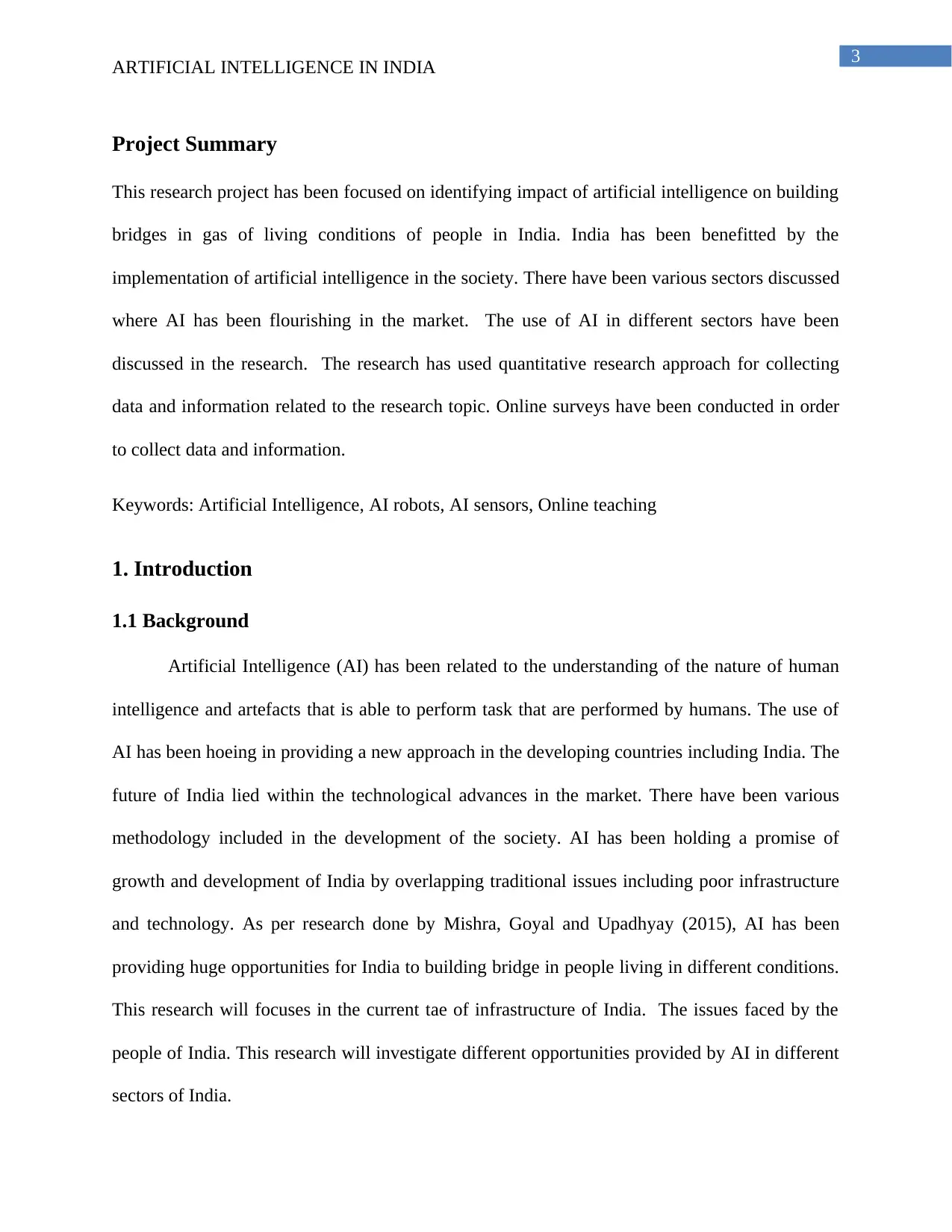
3
ARTIFICIAL INTELLIGENCE IN INDIA
Project Summary
This research project has been focused on identifying impact of artificial intelligence on building
bridges in gas of living conditions of people in India. India has been benefitted by the
implementation of artificial intelligence in the society. There have been various sectors discussed
where AI has been flourishing in the market. The use of AI in different sectors have been
discussed in the research. The research has used quantitative research approach for collecting
data and information related to the research topic. Online surveys have been conducted in order
to collect data and information.
Keywords: Artificial Intelligence, AI robots, AI sensors, Online teaching
1. Introduction
1.1 Background
Artificial Intelligence (AI) has been related to the understanding of the nature of human
intelligence and artefacts that is able to perform task that are performed by humans. The use of
AI has been hoeing in providing a new approach in the developing countries including India. The
future of India lied within the technological advances in the market. There have been various
methodology included in the development of the society. AI has been holding a promise of
growth and development of India by overlapping traditional issues including poor infrastructure
and technology. As per research done by Mishra, Goyal and Upadhyay (2015), AI has been
providing huge opportunities for India to building bridge in people living in different conditions.
This research will focuses in the current tae of infrastructure of India. The issues faced by the
people of India. This research will investigate different opportunities provided by AI in different
sectors of India.
ARTIFICIAL INTELLIGENCE IN INDIA
Project Summary
This research project has been focused on identifying impact of artificial intelligence on building
bridges in gas of living conditions of people in India. India has been benefitted by the
implementation of artificial intelligence in the society. There have been various sectors discussed
where AI has been flourishing in the market. The use of AI in different sectors have been
discussed in the research. The research has used quantitative research approach for collecting
data and information related to the research topic. Online surveys have been conducted in order
to collect data and information.
Keywords: Artificial Intelligence, AI robots, AI sensors, Online teaching
1. Introduction
1.1 Background
Artificial Intelligence (AI) has been related to the understanding of the nature of human
intelligence and artefacts that is able to perform task that are performed by humans. The use of
AI has been hoeing in providing a new approach in the developing countries including India. The
future of India lied within the technological advances in the market. There have been various
methodology included in the development of the society. AI has been holding a promise of
growth and development of India by overlapping traditional issues including poor infrastructure
and technology. As per research done by Mishra, Goyal and Upadhyay (2015), AI has been
providing huge opportunities for India to building bridge in people living in different conditions.
This research will focuses in the current tae of infrastructure of India. The issues faced by the
people of India. This research will investigate different opportunities provided by AI in different
sectors of India.
⊘ This is a preview!⊘
Do you want full access?
Subscribe today to unlock all pages.

Trusted by 1+ million students worldwide
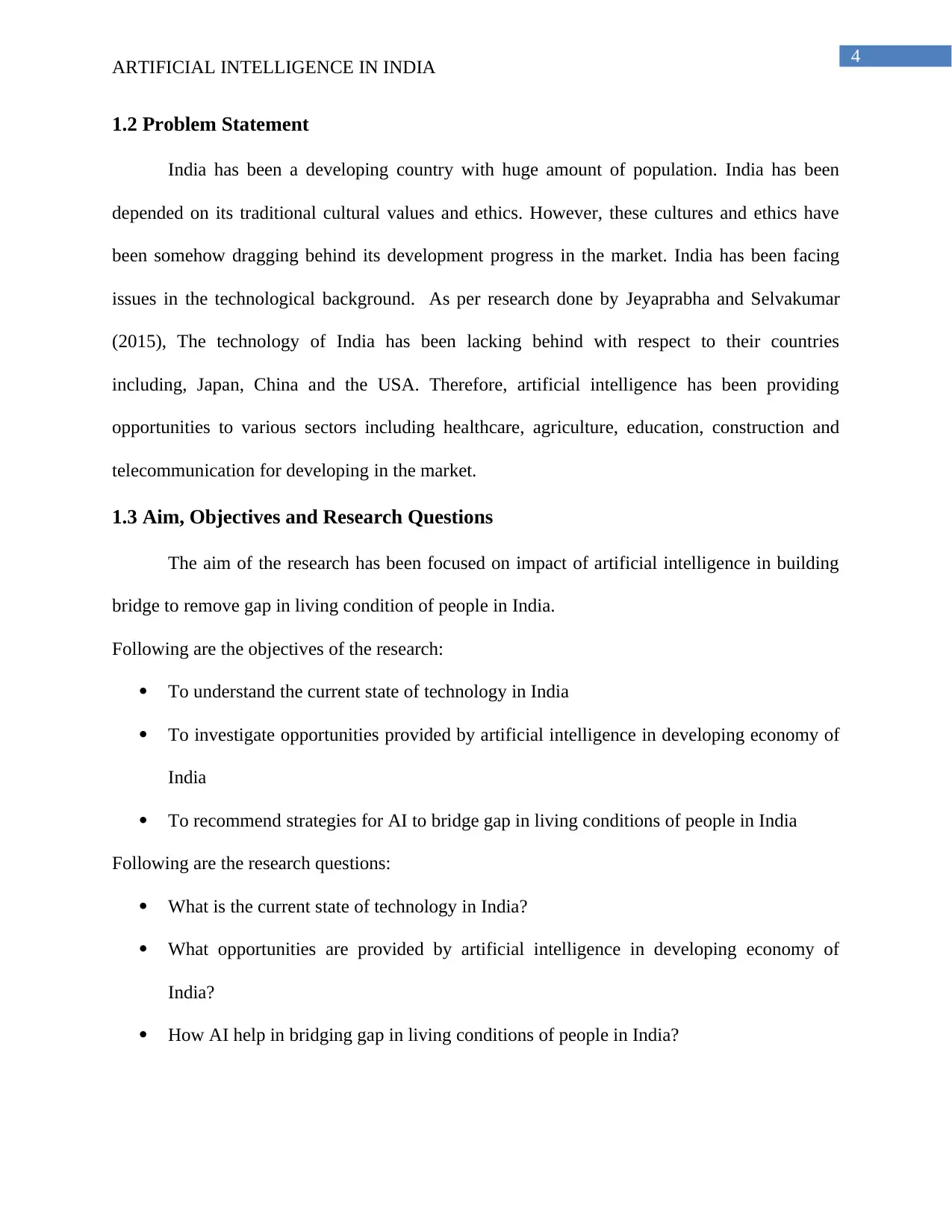
4
ARTIFICIAL INTELLIGENCE IN INDIA
1.2 Problem Statement
India has been a developing country with huge amount of population. India has been
depended on its traditional cultural values and ethics. However, these cultures and ethics have
been somehow dragging behind its development progress in the market. India has been facing
issues in the technological background. As per research done by Jeyaprabha and Selvakumar
(2015), The technology of India has been lacking behind with respect to their countries
including, Japan, China and the USA. Therefore, artificial intelligence has been providing
opportunities to various sectors including healthcare, agriculture, education, construction and
telecommunication for developing in the market.
1.3 Aim, Objectives and Research Questions
The aim of the research has been focused on impact of artificial intelligence in building
bridge to remove gap in living condition of people in India.
Following are the objectives of the research:
To understand the current state of technology in India
To investigate opportunities provided by artificial intelligence in developing economy of
India
To recommend strategies for AI to bridge gap in living conditions of people in India
Following are the research questions:
What is the current state of technology in India?
What opportunities are provided by artificial intelligence in developing economy of
India?
How AI help in bridging gap in living conditions of people in India?
ARTIFICIAL INTELLIGENCE IN INDIA
1.2 Problem Statement
India has been a developing country with huge amount of population. India has been
depended on its traditional cultural values and ethics. However, these cultures and ethics have
been somehow dragging behind its development progress in the market. India has been facing
issues in the technological background. As per research done by Jeyaprabha and Selvakumar
(2015), The technology of India has been lacking behind with respect to their countries
including, Japan, China and the USA. Therefore, artificial intelligence has been providing
opportunities to various sectors including healthcare, agriculture, education, construction and
telecommunication for developing in the market.
1.3 Aim, Objectives and Research Questions
The aim of the research has been focused on impact of artificial intelligence in building
bridge to remove gap in living condition of people in India.
Following are the objectives of the research:
To understand the current state of technology in India
To investigate opportunities provided by artificial intelligence in developing economy of
India
To recommend strategies for AI to bridge gap in living conditions of people in India
Following are the research questions:
What is the current state of technology in India?
What opportunities are provided by artificial intelligence in developing economy of
India?
How AI help in bridging gap in living conditions of people in India?
Paraphrase This Document
Need a fresh take? Get an instant paraphrase of this document with our AI Paraphraser
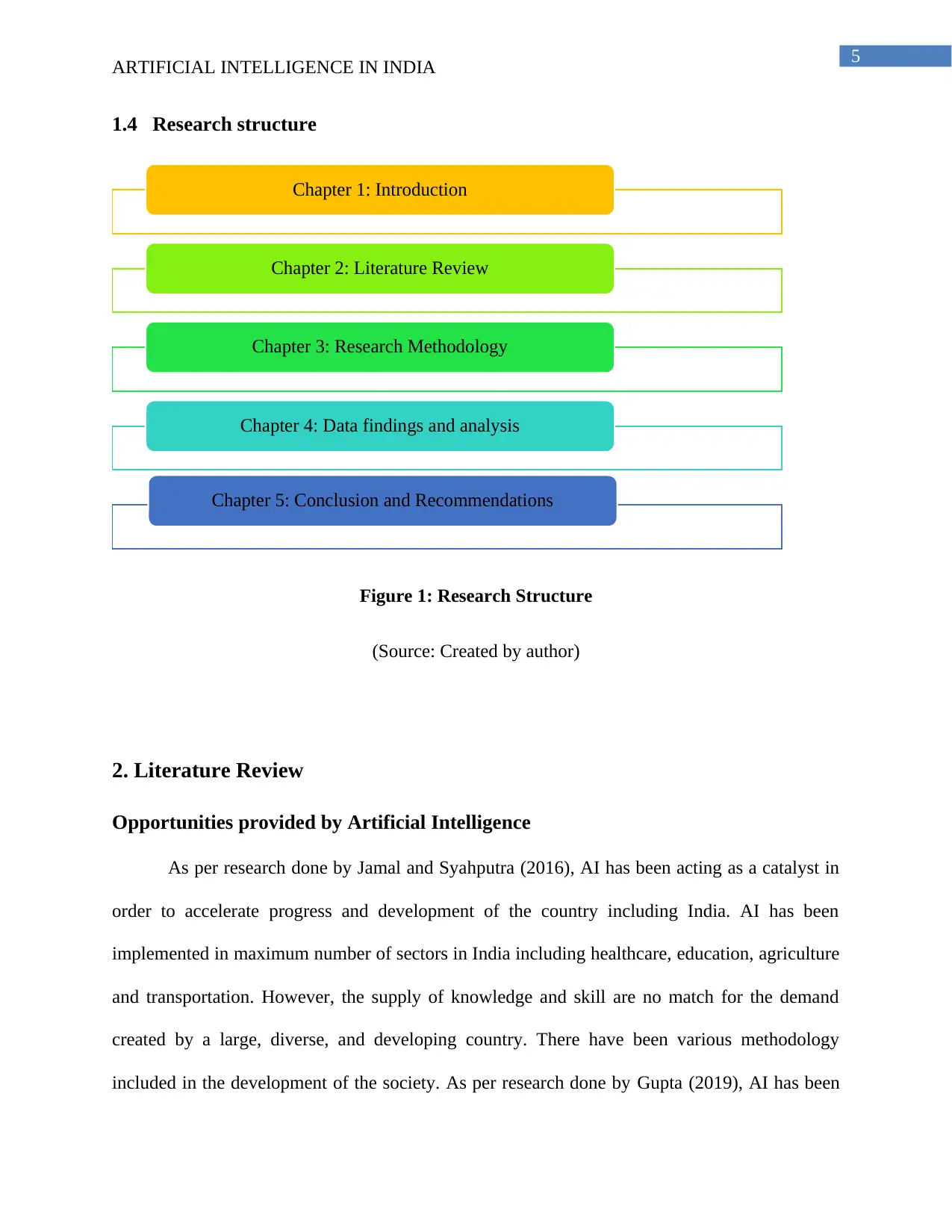
5
ARTIFICIAL INTELLIGENCE IN INDIA
1.4 Research structure
Figure 1: Research Structure
(Source: Created by author)
2. Literature Review
Opportunities provided by Artificial Intelligence
As per research done by Jamal and Syahputra (2016), AI has been acting as a catalyst in
order to accelerate progress and development of the country including India. AI has been
implemented in maximum number of sectors in India including healthcare, education, agriculture
and transportation. However, the supply of knowledge and skill are no match for the demand
created by a large, diverse, and developing country. There have been various methodology
included in the development of the society. As per research done by Gupta (2019), AI has been
Chapter 1: Introduction
Chapter 2: Literature Review
Chapter 3: Research Methodology
Chapter 4: Data findings and analysis
Chapter 5: Conclusion and Recommendations
ARTIFICIAL INTELLIGENCE IN INDIA
1.4 Research structure
Figure 1: Research Structure
(Source: Created by author)
2. Literature Review
Opportunities provided by Artificial Intelligence
As per research done by Jamal and Syahputra (2016), AI has been acting as a catalyst in
order to accelerate progress and development of the country including India. AI has been
implemented in maximum number of sectors in India including healthcare, education, agriculture
and transportation. However, the supply of knowledge and skill are no match for the demand
created by a large, diverse, and developing country. There have been various methodology
included in the development of the society. As per research done by Gupta (2019), AI has been
Chapter 1: Introduction
Chapter 2: Literature Review
Chapter 3: Research Methodology
Chapter 4: Data findings and analysis
Chapter 5: Conclusion and Recommendations
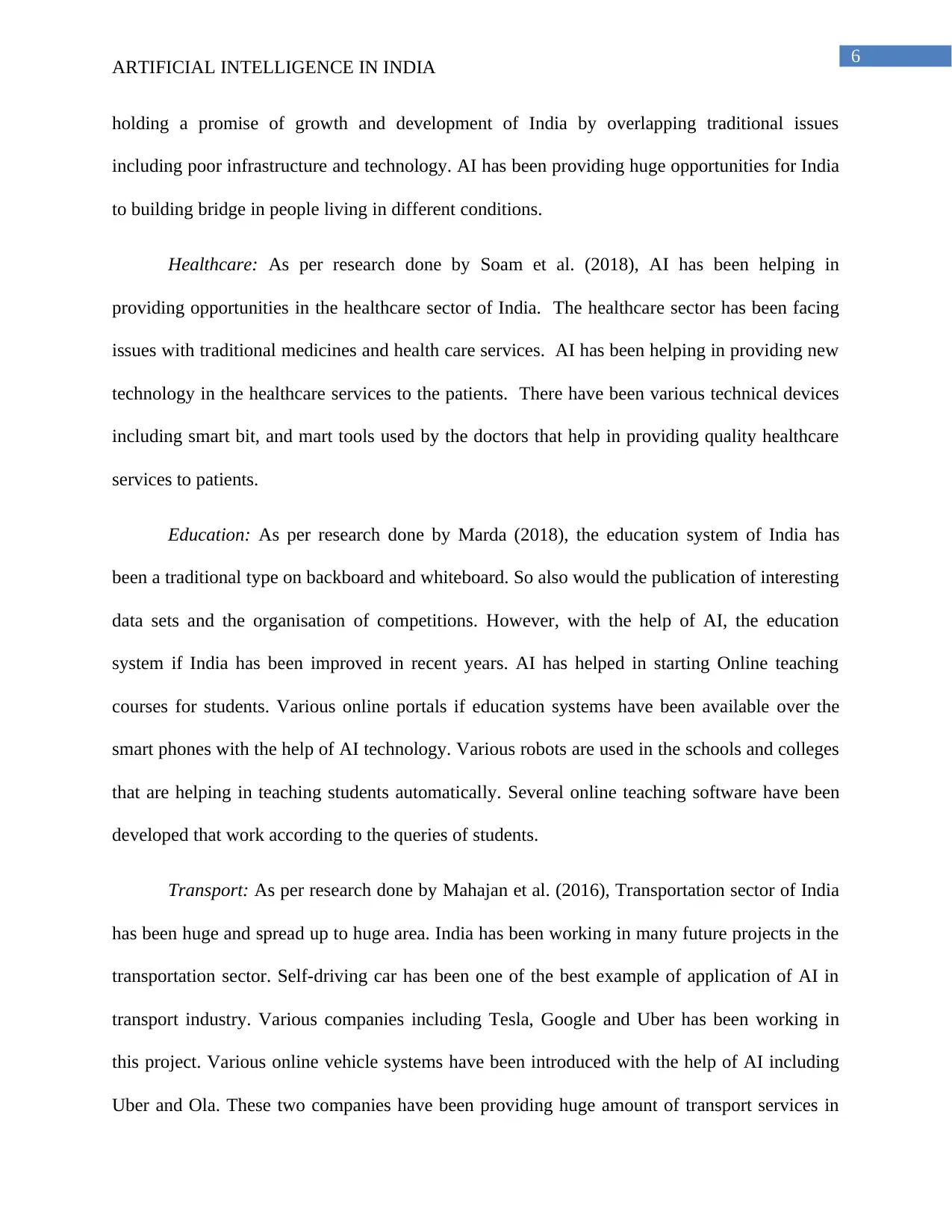
6
ARTIFICIAL INTELLIGENCE IN INDIA
holding a promise of growth and development of India by overlapping traditional issues
including poor infrastructure and technology. AI has been providing huge opportunities for India
to building bridge in people living in different conditions.
Healthcare: As per research done by Soam et al. (2018), AI has been helping in
providing opportunities in the healthcare sector of India. The healthcare sector has been facing
issues with traditional medicines and health care services. AI has been helping in providing new
technology in the healthcare services to the patients. There have been various technical devices
including smart bit, and mart tools used by the doctors that help in providing quality healthcare
services to patients.
Education: As per research done by Marda (2018), the education system of India has
been a traditional type on backboard and whiteboard. So also would the publication of interesting
data sets and the organisation of competitions. However, with the help of AI, the education
system if India has been improved in recent years. AI has helped in starting Online teaching
courses for students. Various online portals if education systems have been available over the
smart phones with the help of AI technology. Various robots are used in the schools and colleges
that are helping in teaching students automatically. Several online teaching software have been
developed that work according to the queries of students.
Transport: As per research done by Mahajan et al. (2016), Transportation sector of India
has been huge and spread up to huge area. India has been working in many future projects in the
transportation sector. Self-driving car has been one of the best example of application of AI in
transport industry. Various companies including Tesla, Google and Uber has been working in
this project. Various online vehicle systems have been introduced with the help of AI including
Uber and Ola. These two companies have been providing huge amount of transport services in
ARTIFICIAL INTELLIGENCE IN INDIA
holding a promise of growth and development of India by overlapping traditional issues
including poor infrastructure and technology. AI has been providing huge opportunities for India
to building bridge in people living in different conditions.
Healthcare: As per research done by Soam et al. (2018), AI has been helping in
providing opportunities in the healthcare sector of India. The healthcare sector has been facing
issues with traditional medicines and health care services. AI has been helping in providing new
technology in the healthcare services to the patients. There have been various technical devices
including smart bit, and mart tools used by the doctors that help in providing quality healthcare
services to patients.
Education: As per research done by Marda (2018), the education system of India has
been a traditional type on backboard and whiteboard. So also would the publication of interesting
data sets and the organisation of competitions. However, with the help of AI, the education
system if India has been improved in recent years. AI has helped in starting Online teaching
courses for students. Various online portals if education systems have been available over the
smart phones with the help of AI technology. Various robots are used in the schools and colleges
that are helping in teaching students automatically. Several online teaching software have been
developed that work according to the queries of students.
Transport: As per research done by Mahajan et al. (2016), Transportation sector of India
has been huge and spread up to huge area. India has been working in many future projects in the
transportation sector. Self-driving car has been one of the best example of application of AI in
transport industry. Various companies including Tesla, Google and Uber has been working in
this project. Various online vehicle systems have been introduced with the help of AI including
Uber and Ola. These two companies have been providing huge amount of transport services in
⊘ This is a preview!⊘
Do you want full access?
Subscribe today to unlock all pages.

Trusted by 1+ million students worldwide
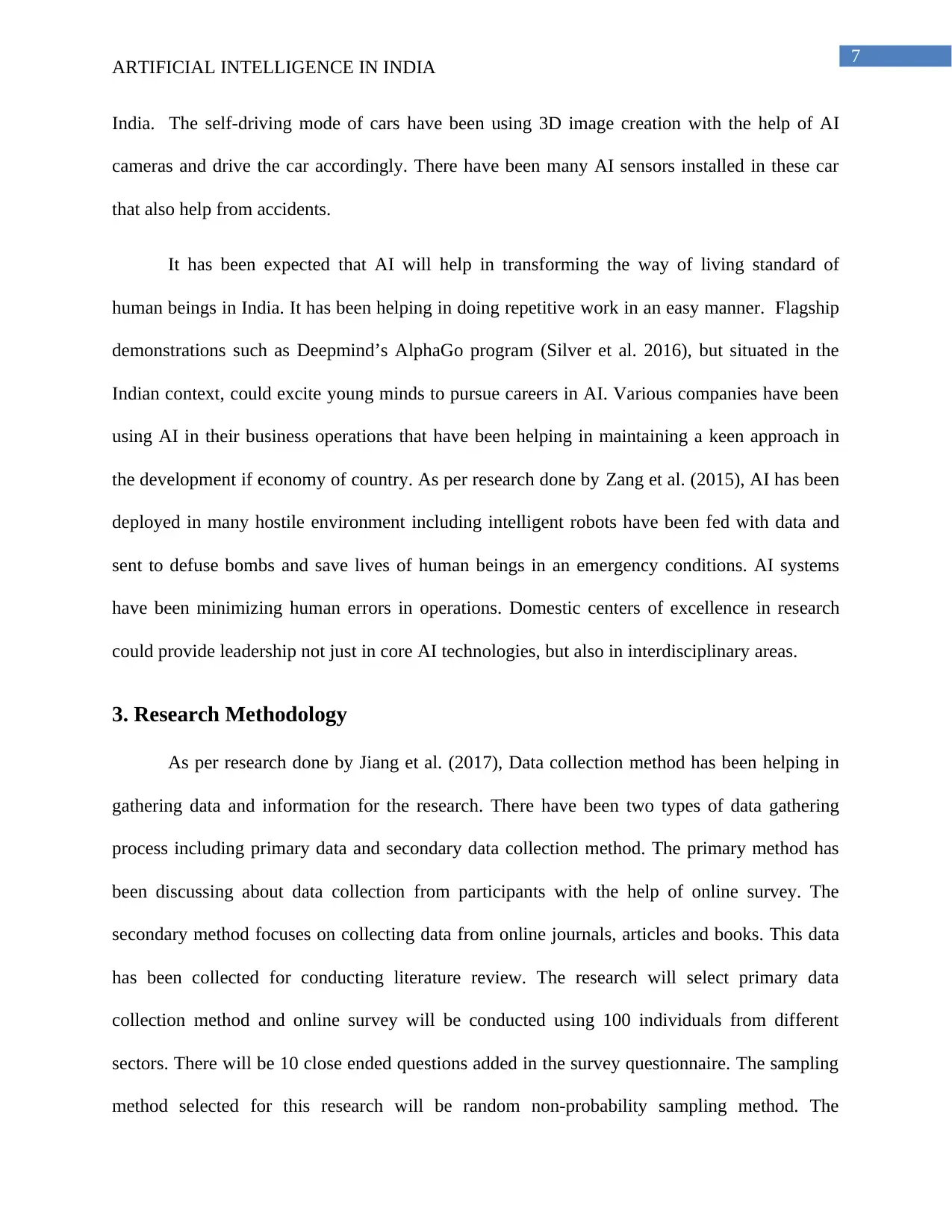
7
ARTIFICIAL INTELLIGENCE IN INDIA
India. The self-driving mode of cars have been using 3D image creation with the help of AI
cameras and drive the car accordingly. There have been many AI sensors installed in these car
that also help from accidents.
It has been expected that AI will help in transforming the way of living standard of
human beings in India. It has been helping in doing repetitive work in an easy manner. Flagship
demonstrations such as Deepmind’s AlphaGo program (Silver et al. 2016), but situated in the
Indian context, could excite young minds to pursue careers in AI. Various companies have been
using AI in their business operations that have been helping in maintaining a keen approach in
the development if economy of country. As per research done by Zang et al. (2015), AI has been
deployed in many hostile environment including intelligent robots have been fed with data and
sent to defuse bombs and save lives of human beings in an emergency conditions. AI systems
have been minimizing human errors in operations. Domestic centers of excellence in research
could provide leadership not just in core AI technologies, but also in interdisciplinary areas.
3. Research Methodology
As per research done by Jiang et al. (2017), Data collection method has been helping in
gathering data and information for the research. There have been two types of data gathering
process including primary data and secondary data collection method. The primary method has
been discussing about data collection from participants with the help of online survey. The
secondary method focuses on collecting data from online journals, articles and books. This data
has been collected for conducting literature review. The research will select primary data
collection method and online survey will be conducted using 100 individuals from different
sectors. There will be 10 close ended questions added in the survey questionnaire. The sampling
method selected for this research will be random non-probability sampling method. The
ARTIFICIAL INTELLIGENCE IN INDIA
India. The self-driving mode of cars have been using 3D image creation with the help of AI
cameras and drive the car accordingly. There have been many AI sensors installed in these car
that also help from accidents.
It has been expected that AI will help in transforming the way of living standard of
human beings in India. It has been helping in doing repetitive work in an easy manner. Flagship
demonstrations such as Deepmind’s AlphaGo program (Silver et al. 2016), but situated in the
Indian context, could excite young minds to pursue careers in AI. Various companies have been
using AI in their business operations that have been helping in maintaining a keen approach in
the development if economy of country. As per research done by Zang et al. (2015), AI has been
deployed in many hostile environment including intelligent robots have been fed with data and
sent to defuse bombs and save lives of human beings in an emergency conditions. AI systems
have been minimizing human errors in operations. Domestic centers of excellence in research
could provide leadership not just in core AI technologies, but also in interdisciplinary areas.
3. Research Methodology
As per research done by Jiang et al. (2017), Data collection method has been helping in
gathering data and information for the research. There have been two types of data gathering
process including primary data and secondary data collection method. The primary method has
been discussing about data collection from participants with the help of online survey. The
secondary method focuses on collecting data from online journals, articles and books. This data
has been collected for conducting literature review. The research will select primary data
collection method and online survey will be conducted using 100 individuals from different
sectors. There will be 10 close ended questions added in the survey questionnaire. The sampling
method selected for this research will be random non-probability sampling method. The
Paraphrase This Document
Need a fresh take? Get an instant paraphrase of this document with our AI Paraphraser
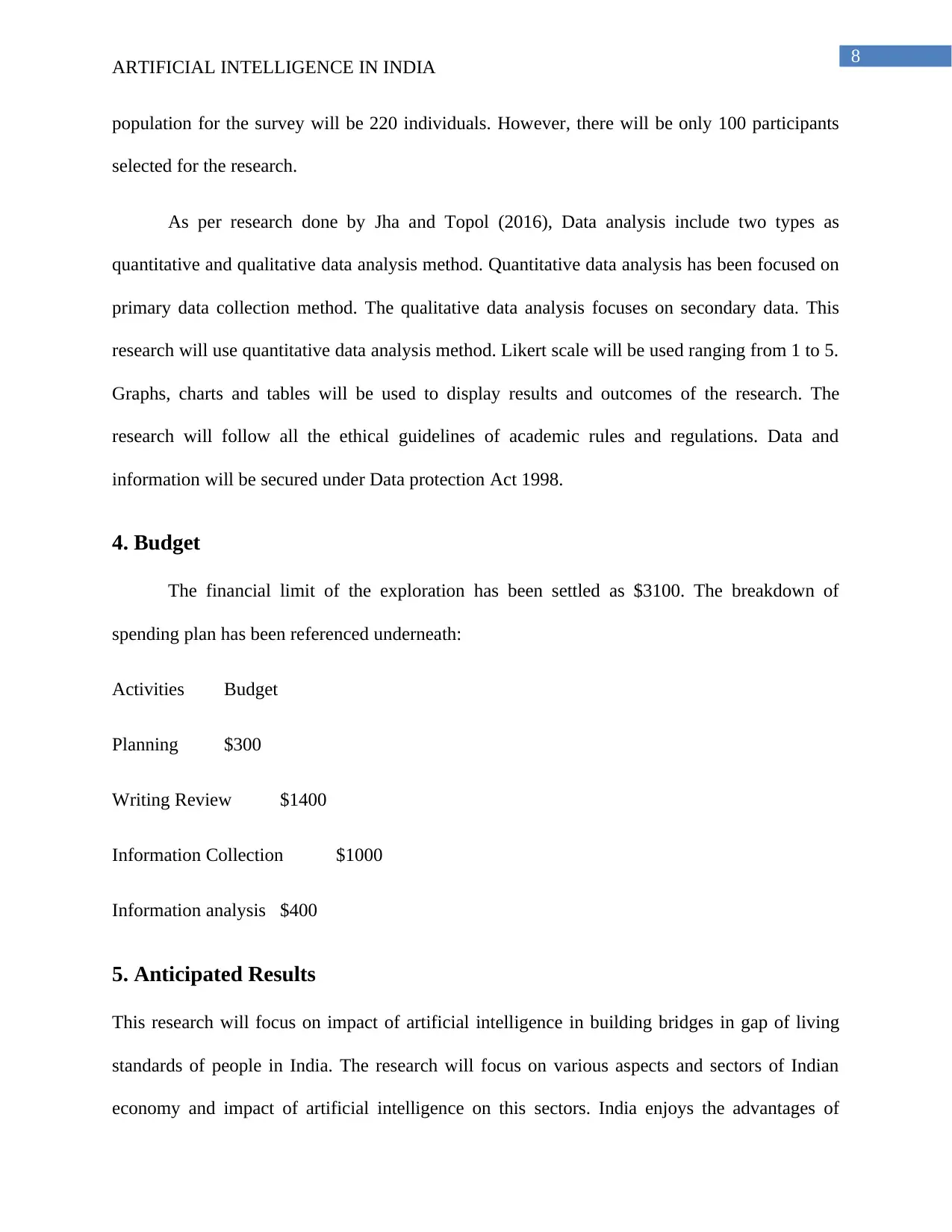
8
ARTIFICIAL INTELLIGENCE IN INDIA
population for the survey will be 220 individuals. However, there will be only 100 participants
selected for the research.
As per research done by Jha and Topol (2016), Data analysis include two types as
quantitative and qualitative data analysis method. Quantitative data analysis has been focused on
primary data collection method. The qualitative data analysis focuses on secondary data. This
research will use quantitative data analysis method. Likert scale will be used ranging from 1 to 5.
Graphs, charts and tables will be used to display results and outcomes of the research. The
research will follow all the ethical guidelines of academic rules and regulations. Data and
information will be secured under Data protection Act 1998.
4. Budget
The financial limit of the exploration has been settled as $3100. The breakdown of
spending plan has been referenced underneath:
Activities Budget
Planning $300
Writing Review $1400
Information Collection $1000
Information analysis $400
5. Anticipated Results
This research will focus on impact of artificial intelligence in building bridges in gap of living
standards of people in India. The research will focus on various aspects and sectors of Indian
economy and impact of artificial intelligence on this sectors. India enjoys the advantages of
ARTIFICIAL INTELLIGENCE IN INDIA
population for the survey will be 220 individuals. However, there will be only 100 participants
selected for the research.
As per research done by Jha and Topol (2016), Data analysis include two types as
quantitative and qualitative data analysis method. Quantitative data analysis has been focused on
primary data collection method. The qualitative data analysis focuses on secondary data. This
research will use quantitative data analysis method. Likert scale will be used ranging from 1 to 5.
Graphs, charts and tables will be used to display results and outcomes of the research. The
research will follow all the ethical guidelines of academic rules and regulations. Data and
information will be secured under Data protection Act 1998.
4. Budget
The financial limit of the exploration has been settled as $3100. The breakdown of
spending plan has been referenced underneath:
Activities Budget
Planning $300
Writing Review $1400
Information Collection $1000
Information analysis $400
5. Anticipated Results
This research will focus on impact of artificial intelligence in building bridges in gap of living
standards of people in India. The research will focus on various aspects and sectors of Indian
economy and impact of artificial intelligence on this sectors. India enjoys the advantages of
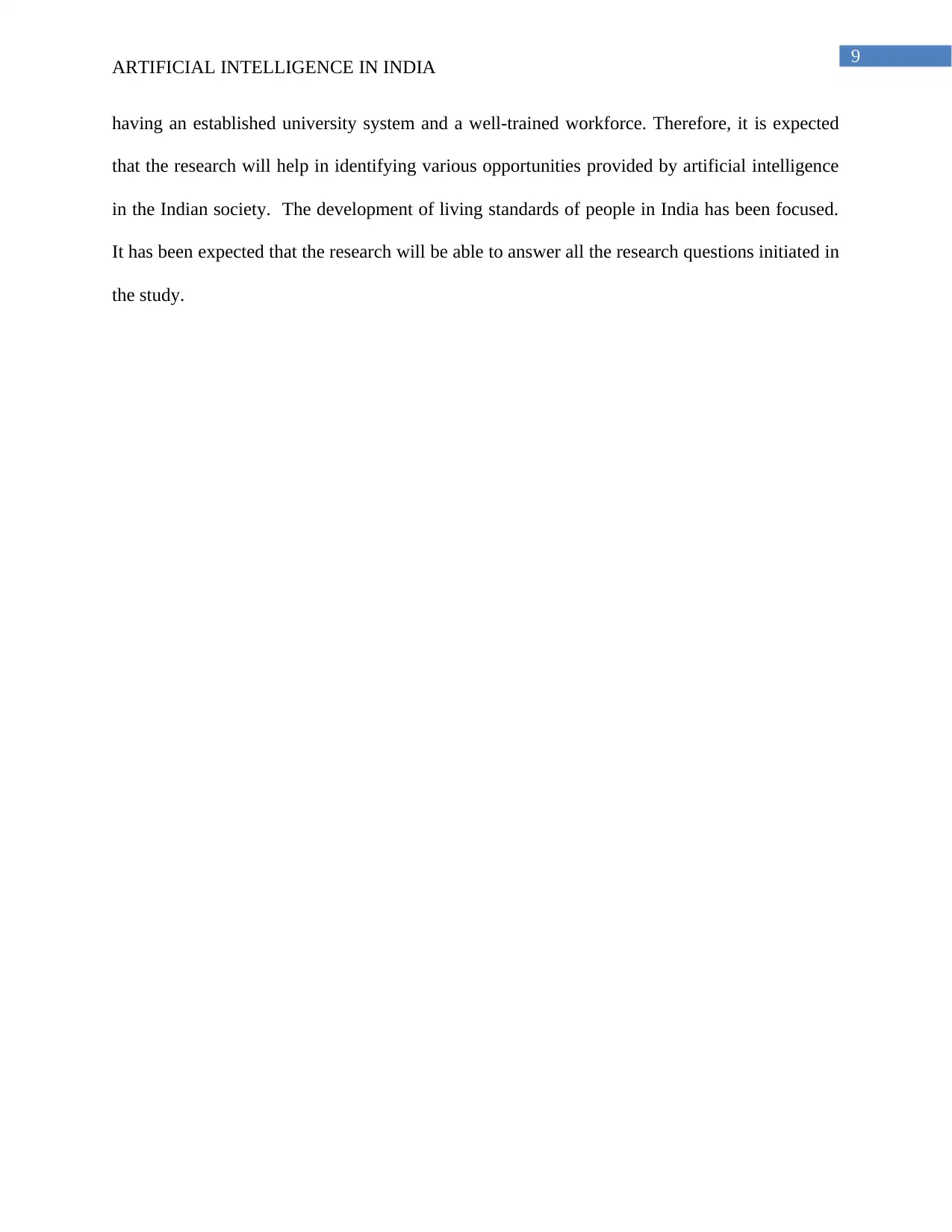
9
ARTIFICIAL INTELLIGENCE IN INDIA
having an established university system and a well-trained workforce. Therefore, it is expected
that the research will help in identifying various opportunities provided by artificial intelligence
in the Indian society. The development of living standards of people in India has been focused.
It has been expected that the research will be able to answer all the research questions initiated in
the study.
ARTIFICIAL INTELLIGENCE IN INDIA
having an established university system and a well-trained workforce. Therefore, it is expected
that the research will help in identifying various opportunities provided by artificial intelligence
in the Indian society. The development of living standards of people in India has been focused.
It has been expected that the research will be able to answer all the research questions initiated in
the study.
⊘ This is a preview!⊘
Do you want full access?
Subscribe today to unlock all pages.

Trusted by 1+ million students worldwide
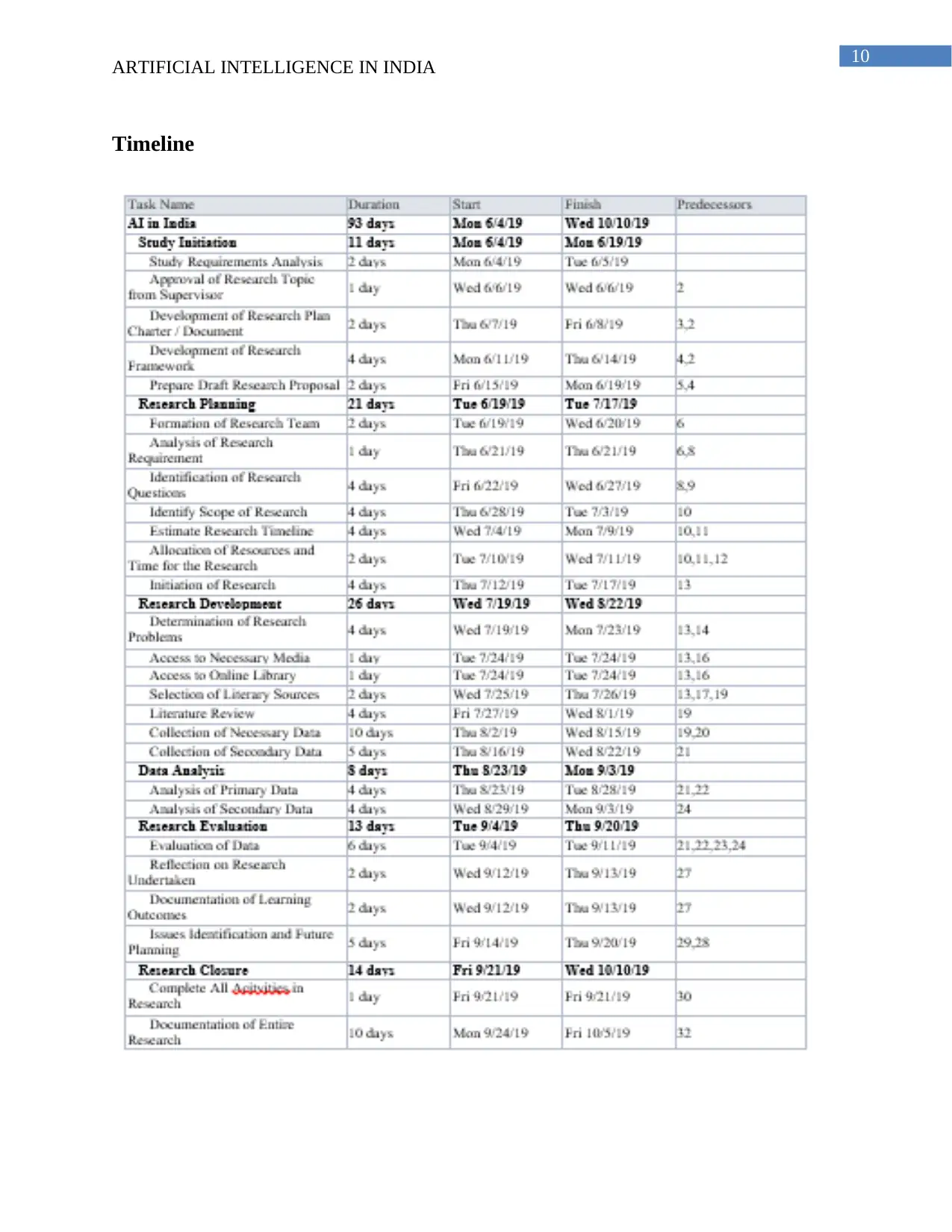
10
ARTIFICIAL INTELLIGENCE IN INDIA
Timeline
ARTIFICIAL INTELLIGENCE IN INDIA
Timeline
Paraphrase This Document
Need a fresh take? Get an instant paraphrase of this document with our AI Paraphraser
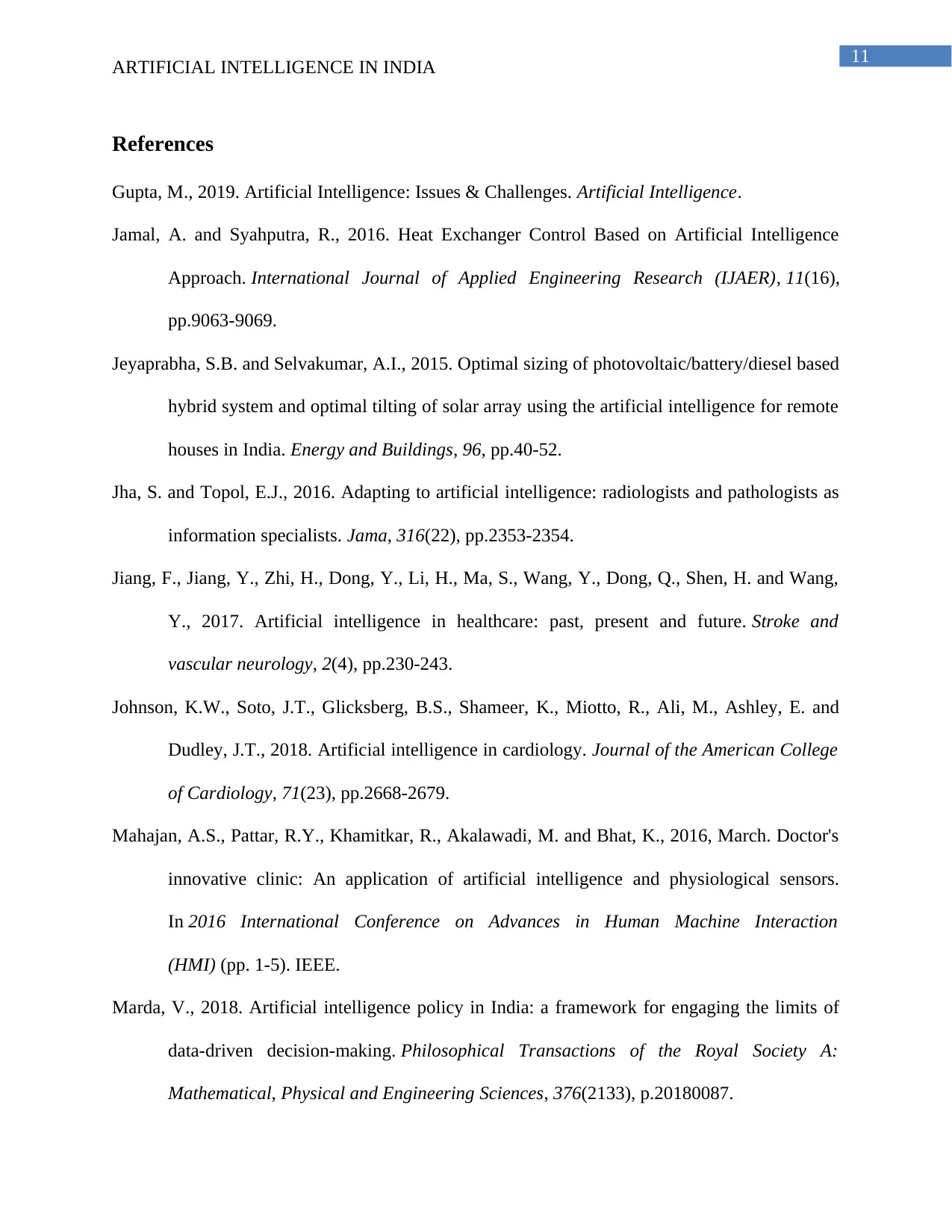
11
ARTIFICIAL INTELLIGENCE IN INDIA
References
Gupta, M., 2019. Artificial Intelligence: Issues & Challenges. Artificial Intelligence.
Jamal, A. and Syahputra, R., 2016. Heat Exchanger Control Based on Artificial Intelligence
Approach. International Journal of Applied Engineering Research (IJAER), 11(16),
pp.9063-9069.
Jeyaprabha, S.B. and Selvakumar, A.I., 2015. Optimal sizing of photovoltaic/battery/diesel based
hybrid system and optimal tilting of solar array using the artificial intelligence for remote
houses in India. Energy and Buildings, 96, pp.40-52.
Jha, S. and Topol, E.J., 2016. Adapting to artificial intelligence: radiologists and pathologists as
information specialists. Jama, 316(22), pp.2353-2354.
Jiang, F., Jiang, Y., Zhi, H., Dong, Y., Li, H., Ma, S., Wang, Y., Dong, Q., Shen, H. and Wang,
Y., 2017. Artificial intelligence in healthcare: past, present and future. Stroke and
vascular neurology, 2(4), pp.230-243.
Johnson, K.W., Soto, J.T., Glicksberg, B.S., Shameer, K., Miotto, R., Ali, M., Ashley, E. and
Dudley, J.T., 2018. Artificial intelligence in cardiology. Journal of the American College
of Cardiology, 71(23), pp.2668-2679.
Mahajan, A.S., Pattar, R.Y., Khamitkar, R., Akalawadi, M. and Bhat, K., 2016, March. Doctor's
innovative clinic: An application of artificial intelligence and physiological sensors.
In 2016 International Conference on Advances in Human Machine Interaction
(HMI) (pp. 1-5). IEEE.
Marda, V., 2018. Artificial intelligence policy in India: a framework for engaging the limits of
data-driven decision-making. Philosophical Transactions of the Royal Society A:
Mathematical, Physical and Engineering Sciences, 376(2133), p.20180087.
ARTIFICIAL INTELLIGENCE IN INDIA
References
Gupta, M., 2019. Artificial Intelligence: Issues & Challenges. Artificial Intelligence.
Jamal, A. and Syahputra, R., 2016. Heat Exchanger Control Based on Artificial Intelligence
Approach. International Journal of Applied Engineering Research (IJAER), 11(16),
pp.9063-9069.
Jeyaprabha, S.B. and Selvakumar, A.I., 2015. Optimal sizing of photovoltaic/battery/diesel based
hybrid system and optimal tilting of solar array using the artificial intelligence for remote
houses in India. Energy and Buildings, 96, pp.40-52.
Jha, S. and Topol, E.J., 2016. Adapting to artificial intelligence: radiologists and pathologists as
information specialists. Jama, 316(22), pp.2353-2354.
Jiang, F., Jiang, Y., Zhi, H., Dong, Y., Li, H., Ma, S., Wang, Y., Dong, Q., Shen, H. and Wang,
Y., 2017. Artificial intelligence in healthcare: past, present and future. Stroke and
vascular neurology, 2(4), pp.230-243.
Johnson, K.W., Soto, J.T., Glicksberg, B.S., Shameer, K., Miotto, R., Ali, M., Ashley, E. and
Dudley, J.T., 2018. Artificial intelligence in cardiology. Journal of the American College
of Cardiology, 71(23), pp.2668-2679.
Mahajan, A.S., Pattar, R.Y., Khamitkar, R., Akalawadi, M. and Bhat, K., 2016, March. Doctor's
innovative clinic: An application of artificial intelligence and physiological sensors.
In 2016 International Conference on Advances in Human Machine Interaction
(HMI) (pp. 1-5). IEEE.
Marda, V., 2018. Artificial intelligence policy in India: a framework for engaging the limits of
data-driven decision-making. Philosophical Transactions of the Royal Society A:
Mathematical, Physical and Engineering Sciences, 376(2133), p.20180087.
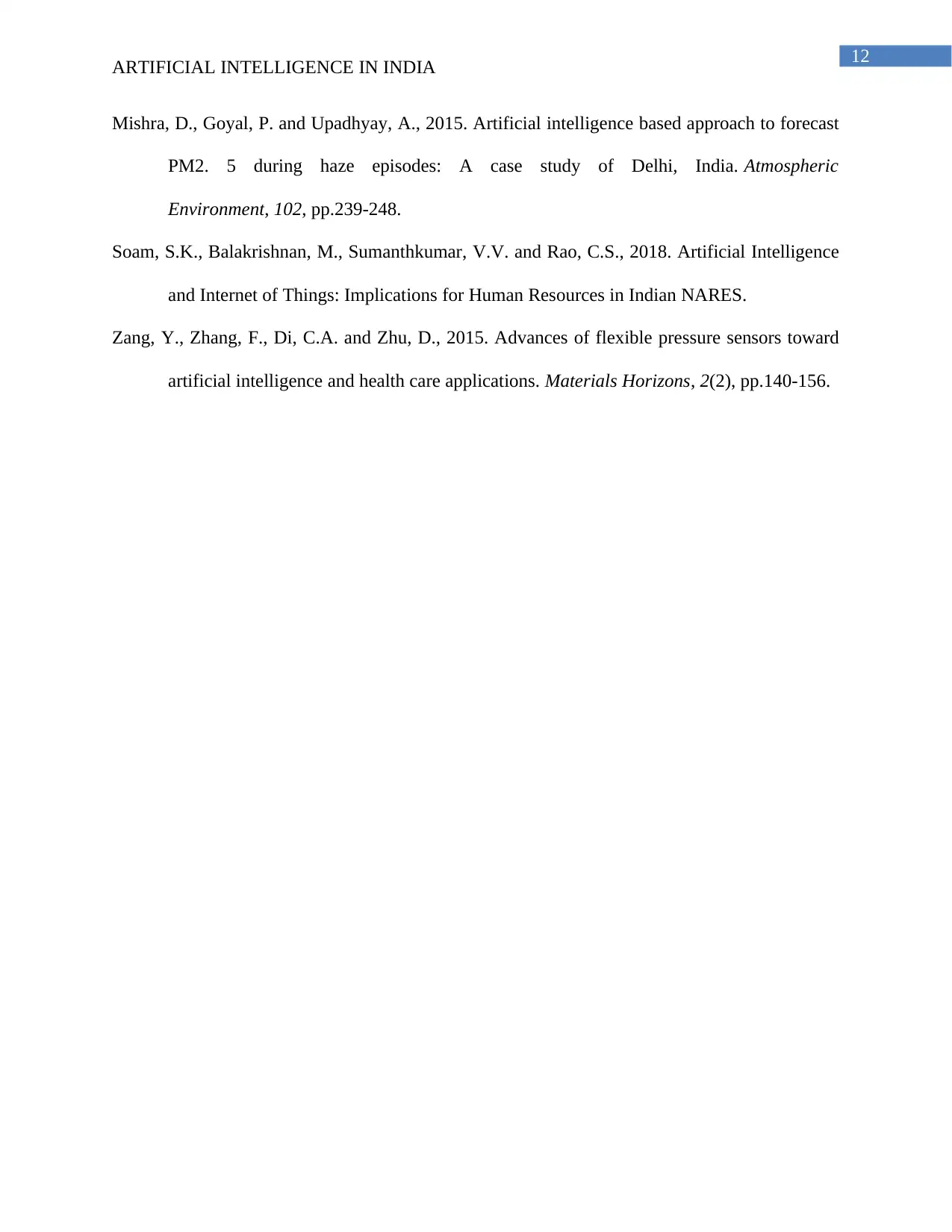
12
ARTIFICIAL INTELLIGENCE IN INDIA
Mishra, D., Goyal, P. and Upadhyay, A., 2015. Artificial intelligence based approach to forecast
PM2. 5 during haze episodes: A case study of Delhi, India. Atmospheric
Environment, 102, pp.239-248.
Soam, S.K., Balakrishnan, M., Sumanthkumar, V.V. and Rao, C.S., 2018. Artificial Intelligence
and Internet of Things: Implications for Human Resources in Indian NARES.
Zang, Y., Zhang, F., Di, C.A. and Zhu, D., 2015. Advances of flexible pressure sensors toward
artificial intelligence and health care applications. Materials Horizons, 2(2), pp.140-156.
ARTIFICIAL INTELLIGENCE IN INDIA
Mishra, D., Goyal, P. and Upadhyay, A., 2015. Artificial intelligence based approach to forecast
PM2. 5 during haze episodes: A case study of Delhi, India. Atmospheric
Environment, 102, pp.239-248.
Soam, S.K., Balakrishnan, M., Sumanthkumar, V.V. and Rao, C.S., 2018. Artificial Intelligence
and Internet of Things: Implications for Human Resources in Indian NARES.
Zang, Y., Zhang, F., Di, C.A. and Zhu, D., 2015. Advances of flexible pressure sensors toward
artificial intelligence and health care applications. Materials Horizons, 2(2), pp.140-156.
⊘ This is a preview!⊘
Do you want full access?
Subscribe today to unlock all pages.

Trusted by 1+ million students worldwide
1 out of 12
Related Documents
Your All-in-One AI-Powered Toolkit for Academic Success.
+13062052269
info@desklib.com
Available 24*7 on WhatsApp / Email
![[object Object]](/_next/static/media/star-bottom.7253800d.svg)
Unlock your academic potential
Copyright © 2020–2026 A2Z Services. All Rights Reserved. Developed and managed by ZUCOL.





